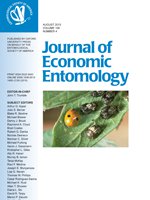Recent populations of the red sunflower seed weevil, Smicronyx fulvus LeConte (Coleoptera: Curculionidae), have been inconsistent or declining, particularly in North Dakota. Consequently, research on weevil biology, including development of resistant germplasm, has been limited. To determine whether cold storage of diapausing larvae could be improved, nonconstant temperature treatments (fluctuating thermal regime [FTR] and thermoperiod [TP]) were tested versus a constant 6°C for storage up to 365 d. Both alternate temperature treatments produced more adult weevils than constant 6°C for short (42, 91 d) storage, while all temperature treatments were good (≥60% adult emergence) at moderate term (182 d) cold storage, and FTR was best for long (365 d) periods. Excluding the 14-d storage period, which produced too few weevils for comparison, each doubling of cold storage time (e.g., from 42 to 91 d, 91 to 182 d), usually decreased the number of days to 50% relative emergence by ∼10 d. After 365 d of larval storage, emerged S. fulvus adults successfully infested sunflowers in a plant growth chamber, with damage per female similar to that observed in field trials. Compared with previous efforts to store weevil larvae, the method of collection and FTR storage is either more effective (greater adult emergence and reduced parasitism) or more time-efficient, and should permit year-round research using S. fulvus adults. Because successful emergence under FTR was >75% after 365 d, additional research would be required to determine the maximum effective duration of cold storage for S. fulvus.
How to translate text using browser tools
1 August 2015
Nonconstant Thermal Regimes Enhance Overwintering Success and Accelerate Diapause Development for Smicronyx fulvus (Coleoptera: Curculionidae)
Jarrad R. Prasifka,
Joseph P. Rinehart,
George D. Yocum
ACCESS THE FULL ARTICLE
It is not available for individual sale.
This article is only available to subscribers.
It is not available for individual sale.
It is not available for individual sale.

Journal of Economic Entomology
Vol. 108 • No. 4
August 2015
Vol. 108 • No. 4
August 2015
diapause
fluctuating thermal regime
host plant resistance
red sunflower seed weevil
thermoperiod




